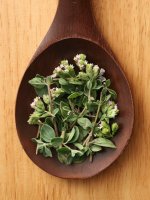nadellii
Active member
I have a spice cabinet filled with dried herbs, which I use. But I can't seem to live without my fresh herbs! They bring something different to each dish. My favorites, and how I like to use them:
Oregano
This is a staple and my favorite! I use both the dried and fresh equally, just for different situations. I tend to use the fresh as a finisher.
Dill
Dill is another herb that is common. t has a fresh, grassy, and slightly sweet flavor. I don't like it all the time, and I find the dried herb to be useless. If I use it, I only use the fresh. I tend to like it in vegetable dishes or dishes with Greens.
Parsley
Parsley is a versatile herb and I use it all the time. It has a fresh, slightly bitter taste, and is often used as a garnish or a flavor enhancer in salads, soups, and sauces.
Mint
This is my favorite fresh herb! I put it in all kinds of savory dishes, particularly those that involve ground meat.
Rosemary
Rosemary has a distinctive, fragrant, and robust flavor, and is used in a variety of Greek dishes.I tend to like it with poultry and sometimes when I make roasted potatoes.
What are your favorites?

Oregano
This is a staple and my favorite! I use both the dried and fresh equally, just for different situations. I tend to use the fresh as a finisher.
Dill
Dill is another herb that is common. t has a fresh, grassy, and slightly sweet flavor. I don't like it all the time, and I find the dried herb to be useless. If I use it, I only use the fresh. I tend to like it in vegetable dishes or dishes with Greens.
Parsley
Parsley is a versatile herb and I use it all the time. It has a fresh, slightly bitter taste, and is often used as a garnish or a flavor enhancer in salads, soups, and sauces.
Mint
This is my favorite fresh herb! I put it in all kinds of savory dishes, particularly those that involve ground meat.
Rosemary
Rosemary has a distinctive, fragrant, and robust flavor, and is used in a variety of Greek dishes.I tend to like it with poultry and sometimes when I make roasted potatoes.
What are your favorites?




